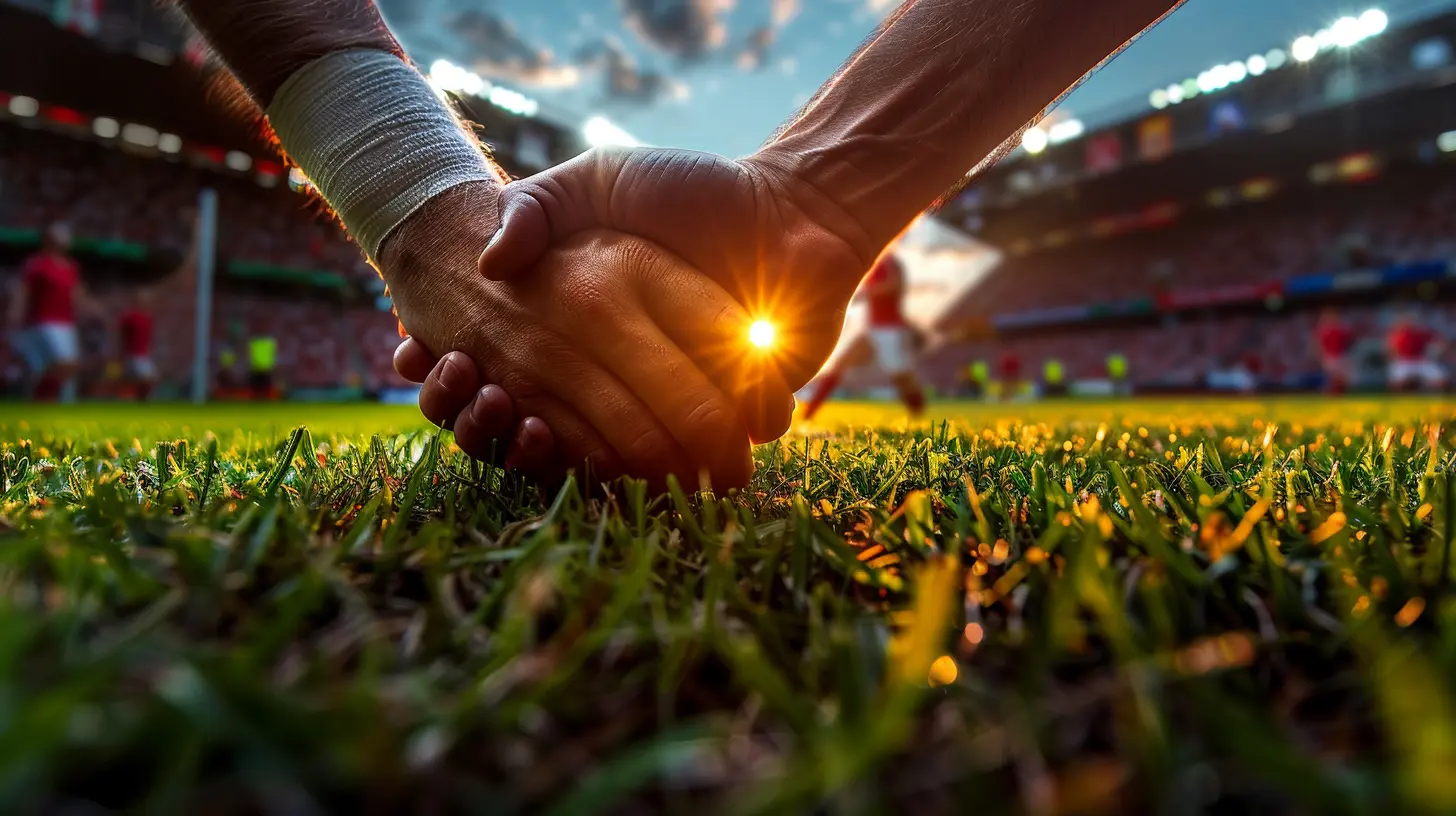The Role of Respect in Building a Sportsmanship Legacy
21 January 2025
When it comes to sports, we often hear about the importance of winning, strategy, and physical skill. But there's another element that’s just as vital, yet often overlooked: respect. In fact, respect isn’t just a nice-to-have quality in sports; it's the foundation of great sportsmanship. Without it, even the most talented athletes can fall short of building a lasting legacy.
Respect can make or break an athlete’s career, but it's not limited to just how you treat your opponents. It extends to teammates, coaches, referees, and even fans. So, how does respect play such a critical role in sportsmanship, and why is it so essential in creating a lasting legacy? Let's dive deep into this topic and explore the different ways respect shapes the world of sportsmanship.

What Exactly Is Sportsmanship?
Before we dig into the role of respect, it’s important to understand what sportsmanship truly means. Sportsmanship isn't just about shaking hands at the end of a game or saying "good job" after a match. It’s about how you conduct yourself both on and off the field.Think of sportsmanship as the unwritten rules of the game—the code of ethics that governs how athletes, coaches, and fans should behave. It’s about playing fair, showing grace in defeat, and being humble in victory. Sportsmanship is the embodiment of respect, integrity, and fairness.
But here's the thing: sportsmanship doesn't magically appear overnight. It takes years of practice, discipline, and, most importantly, respect to build it.

The Core Element: Respect
At the heart of sportsmanship is one key element: respect. Respect isn’t just about being polite; it’s about genuinely valuing others around you, whether they’re on your team or not. Without respect, the spirit of sportsmanship crumbles.But what does respect look like in sports? Here are the fundamental areas where respect plays a crucial role.
Respect for Your Opponents
One of the most obvious forms of respect in sports is how you treat your opponents. It’s easy to get caught up in the heat of competition and see the other team as "the enemy." But at the core of any sport is the understanding that without your opponents, there’s no game.Respecting your opponents means acknowledging their effort, skill, and determination. It doesn’t mean you have to like them, but it does mean you should value their contribution to the competition. After all, without a worthy opponent, your victory wouldn't be nearly as sweet, right?
Remember the iconic moments in sports history where competitors hugged after a grueling match or applauded each other's performance? That’s respect in action. And those moments are remembered far longer than the final score.
Respect for Your Teammates
It might seem like a no-brainer to respect your teammates, but in reality, this can be a challenge, especially in high-pressure environments. When things aren’t going as planned, it’s easy to place blame or let frustration get the better of you. But true sportsmanship means lifting your teammates up, even when the going gets tough.Respecting your teammates means recognizing their strengths and weaknesses and supporting them regardless of their performance. It also means communicating effectively and fostering a healthy team dynamic. In many ways, your relationships with your teammates are just as important as your individual skills on the field. After all, no one wins a game alone.
Respect within a team builds trust, and trust is the secret sauce behind every championship-winning squad. When you respect each other, you play for each other, and that’s where the magic happens.
Respect for Coaches and Referees
Let’s not forget about the people who manage the game. Coaches and referees play a huge role in shaping the outcome of any sporting event. Whether you agree with their decisions or not, they deserve your respect.Respecting your coach means listening to their advice, following instructions, and trusting in their game plan. You don’t have to agree with every decision they make, but undermining their authority only weakens the team.
When it comes to referees, the same principle applies. Nobody likes a bad call, but taking it out on the officials isn’t the answer. Yelling at referees or questioning their integrity not only reflects poorly on you but also disrespects the game itself. Respecting the officials, even when you disagree, is a hallmark of true sportsmanship.
Respect for the Fans
Fans are the heartbeat of any sport. Without them, the game would be a lot less exciting. But respect for fans goes beyond just smiling and waving after a victory. It’s about acknowledging their support, both in good times and bad, and understanding the role they play in the sport's ecosystem.Athletes who show respect for their fans often leave a lasting legacy. They understand that while their skills may win games, it's the fans who fill the stadiums and keep the sport alive. Whether it's signing autographs, taking photos, or simply acknowledging their presence, showing respect for the fans is a crucial aspect of sportsmanship.

The Ripple Effect of Respect
Respect in sports doesn't just stay on the field. It has a ripple effect that can extend far beyond the game. When athletes demonstrate respect, they serve as role models for future generations. Kids who see their heroes treating others with dignity are more likely to adopt those behaviors themselves.We’ve all seen those viral moments on social media where athletes go out of their way to show kindness and respect, whether it’s stopping to help an injured opponent or giving away their game jersey to a young fan. These moments resonate with people because they go beyond the game—they speak to our common humanity.
In this way, respect is not just about building a sportsmanship legacy for yourself; it’s about shaping the next generation of athletes and fans. When respect becomes the norm, the entire culture of sports improves.

Building a Lasting Legacy Through Respect
When it’s all said and done, what do you want to be remembered for? Sure, championships and MVP awards are great, but they fade over time. What truly lasts is the impact you leave on others. Athletes who build a legacy of respect are the ones who are remembered long after their playing days are over.Just think of some of the greatest athletes in history—Michael Jordan, Serena Williams, Lionel Messi. Yes, they’re known for their incredible talent, but they’re also remembered for the way they carried themselves. Their respect for the game, their opponents, and their teammates played a huge role in cementing their legacy.
Respect helps you build relationships, not just trophies. And at the end of the day, it's the relationships you build through sports that will stand the test of time.
Why Respect Matters More Than Ever
In a world where competition is fierce and winning is often seen as the ultimate goal, respect can sometimes take a backseat. But in reality, it’s more important than ever. With the rise of social media and instant coverage, athletes are constantly in the spotlight. Every action, every word is scrutinized.In this environment, respect becomes even more critical. One moment of disrespect can tarnish your reputation, while consistent acts of respect can elevate you to legendary status. Athletes who prioritize respect are not just playing for themselves—they’re playing for something bigger. They’re playing for the love of the game, for their community, and for the legacy they’ll leave behind.
Conclusion: Respect Is the Cornerstone of Sportsmanship
At the end of the day, respect is not just a part of sportsmanship—it is the cornerstone of it. Whether you’re an athlete, coach, fan, or referee, respect forms the foundation of every interaction in sports. It’s what transforms a good player into a great one, and a great player into a legend.So next time you step onto the field or tune into a game, remember that respect isn’t just a word—it’s an action. And it’s those actions that, over time, build a legacy that will last long after the final whistle has blown.
###
all images in this post were generated using AI tools
Category:
SportsmanshipAuthor:

Ruben McCloud
Discussion
rate this article
16 comments
Valentina McQuillen
Great insights! It's fascinating how respect shapes not only individual athletes but also the culture of sports as a whole. Curious to see how this evolves in future generations!
April 1, 2025 at 6:29 PM

Ruben McCloud
Thank you! I agree, it's exciting to think about how respect will continue to influence both athletes and the broader sports culture in the future.
Ava Blair
Respect is fundamental in sports; it not only enhances competition but also fosters a positive environment, ensuring a lasting legacy for future athletes.
February 7, 2025 at 8:13 PM

Ruben McCloud
Thank you for your insightful comment! I completely agree—respect is essential for fostering healthy competition and a positive atmosphere in sports, paving the way for future generations of athletes.
Dakota McLain
What a fantastic read! Respect truly is the foundation of sportsmanship, fostering camaraderie and integrity. Let's continue to uplift each other and create a legacy that inspires future generations!
January 29, 2025 at 9:54 PM

Ruben McCloud
Thank you for your thoughtful comment! I completely agree—respect is essential for nurturing a positive sportsmanship legacy. Let's keep inspiring each other!
Jax Alvarez
Respect is foundational in sports; it fosters teamwork, enhances competition, and cultivates lasting legacies that inspire future athletes and fans alike.
January 29, 2025 at 11:20 AM

Ruben McCloud
Thank you for your insightful comment! I completely agree—respect truly is the cornerstone of sportsmanship and crucial for inspiring future generations.
Kaleb Palmer
Respect fuels greatness in sports—let’s build legacies on kindness and teamwork together!
January 29, 2025 at 4:26 AM

Ruben McCloud
Thank you! I completely agree—kindness and teamwork are fundamental in fostering respect and creating a lasting sportsmanship legacy.
Kai McVey
Respect is fundamental in sports; it shapes character, fosters teamwork, and ensures a lasting legacy.
January 28, 2025 at 7:49 PM

Ruben McCloud
Absolutely! Respect is the cornerstone of sportsmanship, guiding athletes to build strong character, work collaboratively, and leave a positive legacy.
Avery McDowell
Great read! Respect truly is the unsung hero of sportsmanship. It’s not just about winning; it’s about uplifting each other and creating a legacy of kindness. Let’s champion respect both on and off the field—after all, the greatest victories are those that bring us closer together! Keep it up!
January 28, 2025 at 11:46 AM

Ruben McCloud
Thank you! I'm glad you enjoyed the article. Absolutely, respect is crucial in fostering community and sportsmanship. Let's continue to promote it!
Lola Gonzalez
Respect in sports? Absolutely! But let's not pretend it's all sunshine and rainbows. It’s a two-way street; respect is earned, not given. If you want a legacy, start by showing up with integrity, not just a jersey and a flashy attitude!
January 27, 2025 at 5:36 AM

Ruben McCloud
You're absolutely right! Respect is indeed a two-way street, and integrity is the foundation of true sportsmanship. Thanks for your insightful comment!
Rhea McFarlane
This article sparks intriguing thoughts on how respect shapes sportsmanship. I'm curious—how can we actively foster respect among athletes and fans alike?
January 26, 2025 at 8:00 PM

Ruben McCloud
Thank you for your insightful comment! We can actively foster respect by promoting open communication, emphasizing positive role models, and encouraging inclusive practices that celebrate diversity in sports.
Penelope Vance
Respect in sports? It's like trying to score in a game while wearing roller skates—tricky, but when you nail it, everyone’s cheering and laughing (mostly at your clothes)!
January 26, 2025 at 4:53 AM

Ruben McCloud
That's a clever analogy! Just like scoring while on roller skates, respect in sports can be challenging but ultimately leads to a positive and memorable experience for everyone involved.
Zayne Sullivan
Respect makes champions rise!
January 25, 2025 at 4:39 AM

Ruben McCloud
Absolutely! Respect is the foundation that fosters teamwork, integrity, and excellence in sports, ultimately leading to champions.
Faryn McNab
Great article! I appreciate how you highlighted the importance of respect in fostering sportsmanship. It’s essential for athletes and fans alike to promote a culture of honor and integrity in sports. Building this legacy not only enriches the game but also unites communities. Thank you!
January 23, 2025 at 8:13 PM

Ruben McCloud
Thank you for your thoughtful comment! I'm glad you found the article valuable and appreciate your insights on the importance of respect in sports.
Beatrice Kline
Respect is the foundation of true sportsmanship—let's inspire future generations together!
January 23, 2025 at 1:58 PM

Ruben McCloud
Thank you for highlighting the importance of respect in sportsmanship! Together, we can indeed inspire future generations to uphold these values.
Julianne McCord
This article beautifully highlights how respect is foundational in sportsmanship. It’s a reminder that true competition goes beyond winning; it’s about honoring our opponents and the game itself. Building a legacy of respect can inspire future generations, fostering a culture where integrity and camaraderie thrive. Excellent insights!
January 23, 2025 at 3:55 AM

Ruben McCloud
Thank you for your thoughtful comment! I'm glad you found the insights on respect in sportsmanship meaningful. It truly is essential for fostering a positive legacy.
Camille Stewart
Great read! Respect truly is the foundation of sportsmanship. It shapes both players and the spirit of the game!
January 22, 2025 at 12:43 PM

Ruben McCloud
Thank you! I completely agree—respect is essential in fostering true sportsmanship and enriching the game for everyone involved.
Patricia Bishop
Respect is the cornerstone of true sportsmanship, forging bonds that transcend competition. By honoring our opponents and the spirit of the game, we create a legacy that inspires future generations. Let’s champion respect on and off the field—it's not just about winning, but about uplifting one another in the pursuit of greatness!
January 21, 2025 at 12:29 PM

Ruben McCloud
Thank you for your insightful comment! Absolutely, respect is essential for fostering a positive sportsmanship legacy that inspires future athletes.
MORE POSTS

How Athletes Can Use Breathing Techniques to Boost Focus and Calm

How to Adapt to a Box-and-One Defense in Basketball

The Art of Passing: Improving Team Efficiency

Luxury Tax and Its Impact on High-Profile Sports Contracts

How to Enhance Your Skills With Virtual Sports Analytics

An Inside Look at the Legal Consequences of Doping

Developing a Strong Bench: Why Depth Matters in Team Sports

How Sports Legends Are Leaving a Lasting Legacy On and Off the Field

The Influence of Home-Field Advantage in Sports Betting

The Most Inspiring Success Stories in Sports Celebrity History